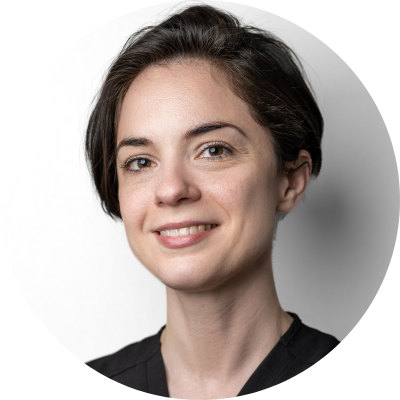Deacon Spotlight: Erin Robinson
Erin Robinson (’09, BA Anthropology, minor in Cultural Preservation)
Practice Manager at Prism Veterinary Dentistry in Brooklyn, NY

Tell us about your current job role and employer. What are you currently working on?
I’ve been in Practice Manager at Prism Veterinary Dentistry since November 2022. Before that, I spent most of my career in management roles within animal welfare nonprofits. After many years, I got burnt out but didn’t want to leave the animal field entirely, so I transitioned to private practice management.
A day in my life as a practice manager looks like ordering inventory, keeping track of inventory, overseeing financials, ensuring that we’re lucrative, and basically just keeping things running. That also means that I, along with our medical director, are creating a space for our staff that is healthy and that they want to come to 40 hours a week.
Prism is a unique practice that provides dentistry for cats and dogs. Unlike general practitioners who handle basic dental services like cleanings, x-rays, and extractions, we offer specialized veterinary dentistry. There aren’t many veterinary dentists, so there’s a huge need for our services.
What key personal and/or career experiences led you to where you are today?
My first job out of school was doing public health research at Wake Forest Hospital, focusing on migrant farm workers and rural elderly populations in North Carolina. I led a field research team, spending several days a week in extremely rural areas, which greatly improved my Spanish, though I’ve since lost much of it. After a year, my partner’s PhD program took us to Gainesville, Florida, where I struggled to continue in public health research.
I had volunteered with the Forsyth County Humane Society while at Wake Forest, which led me to apply for a receptionist position at a spay-neuter clinic in Gainesville. After about a year, we moved to the DC area, and from there, I spent a few years working in program management at the Washington DC Humane Society, which is now known as the Humane Rescue Alliance.
We then decided to move to New York, where I joined the ASPCA. I spent three years there before realizing I needed to transition out of animal welfare due to the emotional toll, which led me to private practice management. I love the work that animal welfare is and the cutting edge developments that are happening, but I was finding it just too difficult to separate myself emotionally from the work.
What is the most challenging aspect of your job? How do you navigate that challenge?
Before coming to Prism, I was used to working in large organizations where higher-ups handled the big-picture planning and goal setting. Now, along with a few others, I’m the one in charge of that, which is a new skill for me. It’s been a challenge to develop that kind of strategic thinking, especially at this stage in my career.
I’m grateful for the support I have because I can openly discuss when I’m struggling with setting clinic goals and get help with it. Previously, I focused on smaller goals and worked towards larger objectives set by others. Now, creating those large goals myself is the biggest challenge.
What advice would you give to Wake Forest graduates about developing their personal life habits after college (finances, health, values, work/life balance)?
I believe it’s unbelievably vital to establish and stick to your boundaries. I wasn’t good at this until my current job, where I finally put my foot down after years of letting work spill into my personal life.
As a manager, I sometimes have to work from home or handle tasks outside regular hours, but I no longer respond to emails or check Slack after business hours. Setting up my team to handle things in my absence has been invaluable for my mental and physical health. It can be scary since our society often doesn’t value this, but if you work with people who share your values, they’ll support you. My advice to anyone is to know your worth and protect your time both at work and outside of it.
We know that relationships are important for any kind of development. How do you build and maintain your network?
Being neurodivergent, I find networking events, small talk, and building relationships challenging. I struggle with meeting new people and making friends. However, I focus on creating and maintaining quality relationships with my direct colleagues. If I meet new people through those connections, that’s great, and I’m happy to maintain those relationships. Teamwork and the quality of relationships are very important to me.
What advice would you give to current Wake Forest students and/or young alumni who are interested in working in your industry?
My advice is to be truly willing to start anywhere. I began my career as a receptionist and kennel assistant, doing tasks like cleaning up after animals. But I still loved it because I knew the work was impactful.
If you’re aiming for a career in veterinary medicine or animal welfare on the operational side, frontline experience is invaluable. It positively influences your decisions as you advance. Knowing what it’s like to be a veterinary assistant helps me understand and support my team better. The first job you get out of college might not be your dream job, but every experience is valuable and shapes your career.
What’s next for your career? What future goals or plans are you pursuing?
I’m still relatively new to my role, not quite two years in yet. Our practice aims to keep growing, which means adding more veterinary dentists to the team—a challenging task since there aren’t many available.
The logical next step for me might be moving to a senior practice manager role, overseeing office managers or practice managers across multiple locations. All that said, I have no desire to leave where I currently am. I’m very happy.
Story published in July 2024. For current updates about Erin, visit their Linkedin.
